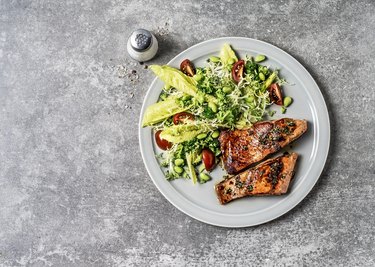
Eating healthily, combined with regular exercise, is the key to healthy weight management for men. Choosing a nutrient-dense, calorie-controlled diet helps men look — and feel — their best.
About 74 percent of U.S. men have overweight or obesity, reports the National Institute of Diabetes and Digestive and Kidney Diseases, which increases their risk for heart disease and diabetes. Making it a point to meet men's daily nutrition requirements may help you maintain a healthier weight and reduce your risk of other health conditions that come with carrying excess body weight.
Video of the Day
Video of the Day
Calorie Needs for Men
As a general rule, most men require 2,000 to 3,000 calories a day to maintain healthy weights, according to the Dietary Guidelines for Americans. Using a man's body weight and activity level also helps estimate his daily nutrition needs. Harvard Health Publishing suggests men need 18 calories per pound of body weight if they're active, 16 calories per pound if they are moderately active and about 13 calories per pound of body weight if they're sedentary. Men with overweight or obesity can lose about one pound weekly by reducing their current intake by 500 calories a day.
Read more: 10 Health Issues Men Need to Be Aware Of
Protein Needs for Men
The protein needs of men are generally based on their body weights and activity levels. The recommended dietary allowance, or RDA, for men is 56 grams of protein per day, according to the Institute of Medicine. However, men who exercise regularly may require up to 1.3 grams of protein per pound of their body weight each day, according to the International Society of Sports Nutrition. Healthy, protein-rich options include egg whites; lean red meats; skinless poultry; low-fat dairy foods, such as cottage cheese; legumes; nuts; and seeds.
Carbohydrates and Fat
Men should obtain 45 percent to 65 percent of their calorie intake from carbohydrates, and 20 percent to 35 percent from dietary fat, advises the Institute of Medicine. This means men who eat 2,500 calories a day should aim for 281 to 406 grams of carbohydrates and 56 to 97 grams of fat — since carbohydrates contain 4 calories per gram and fat provides 9 calories in each gram.
Nutritious, carbohydrate-containing foods are vegetables, fruits, whole grains, low-fat milk, legumes, nuts and seeds. Healthy fats are found in plant-based oils, fish oil, nuts, seeds, nut butters, olives and avocados.
Read more: 1,500-Calorie Diet for Men
Vitamins and Minerals
Men following well-balanced meal plans likely get all the vitamins and minerals they need daily. However, ask your doctor if a multivitamin supplement is appropriate for you. Calcium is an important nutrient for the aging population, including men, to help prevent osteoporosis. Vitamin D deficiency is a concern for older men, men who get little sun exposure and those with dark skin, notes the Office of Dietary Supplements. Good food sources of vitamin D include fortified milk, eggs and fatty fish such as salmon.
Men who plan to have children should get plenty of zinc, since zinc deficiency may affect the quality and motility of your sperm, according to a June 2018 review in PLOS. Oysters, red meat, shellfish and pumpkin seeds can all help you meet your daily zinc needs.
- National Institute of Diabetes and Digestive and Kidney Diseases: "Overweight and Obesity Statistics"
- 2015-2020 Dietary Guidelines For Americans: "Appendix 2: Estimated Calorie Needs Per Day, by Age, Sex and Physical Activity Level"
- Harvard Health Publishing: "Good Nutrition: Should Guidelines Differ for Men and Women?"
- Food and Nutrition Board: Institute of Medicine: Dietary Reference Intakes: "Dietary Reference Intakes (DRIs): Recommended Dietary Allowances and Adequate Intakes, Total Water and Macronutrients"
- Journal of the International Society of Sports Nutrition: "International Society of Sports Nutrition Position Stand: Protein and Exercise"
- Office of Dietary Supplements: "Vitamin D"
- Office of Dietary Supplements: "Zinc"
- PLOS: "Zinc: A Small Molecule With a Big Impact on Sperm Function"
Is this an emergency? If you are experiencing serious medical symptoms, please see the National Library of Medicine’s list of signs you need emergency medical attention or call 911.